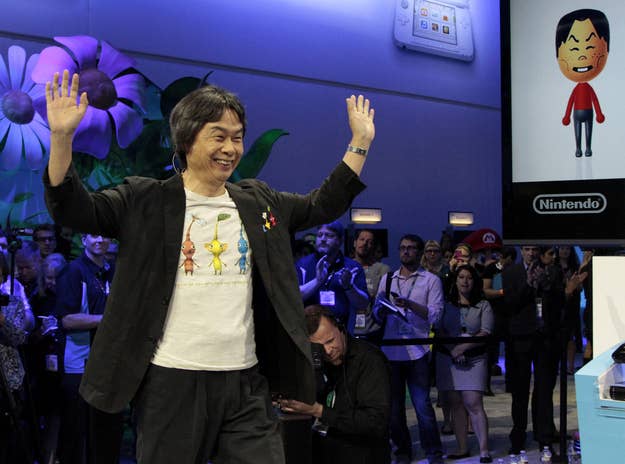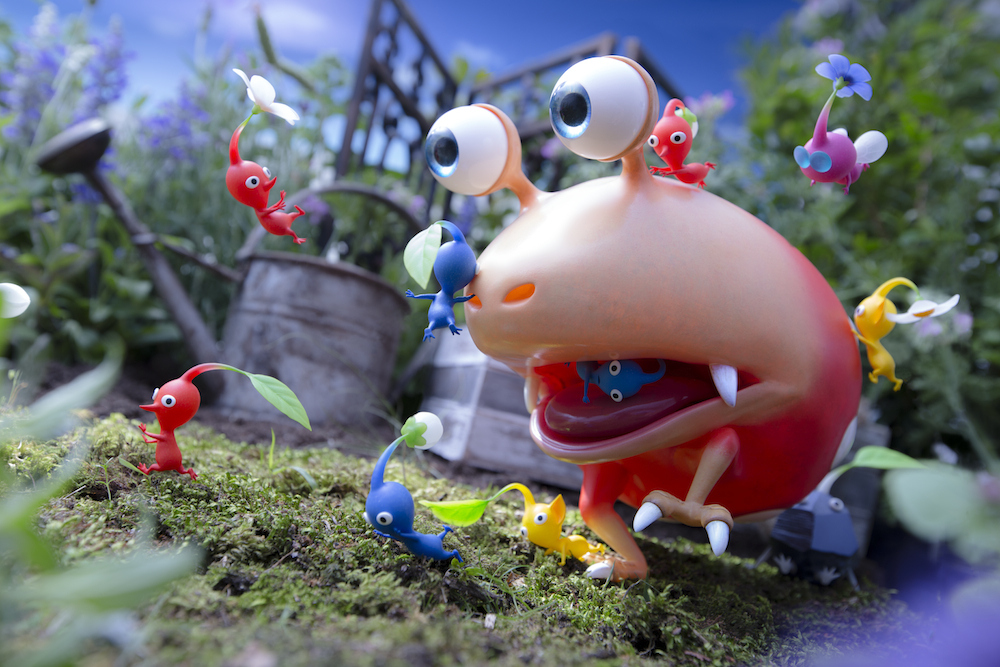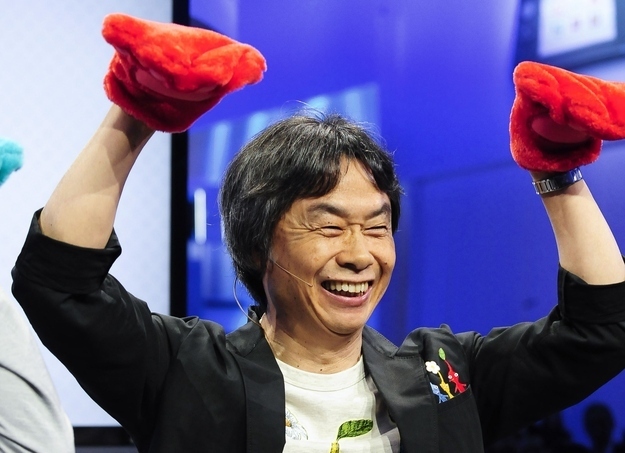
LOS ANGELES — With so much hullabaloo at the 2013 Electronic Entertainment Expo dedicated to the chest beating between Microsoft and Sony, it's perhaps easy to forget that the company with arguably the most at stake at E3 this year is Nintendo. Sales for the Wii U have been shockingly weak since the console launched last November, and all the buzz surrounding the PS4 and Xbox One isn't helping the once dominant Kyoto company make an impact heading into the holiday buying season. To shake things up, the company even staged an abbreviated press briefing at the Nintendo pavilion on the E3 show floor Tuesday morning, in order to swiftly get the gaming press in front of its new suite of Wii U games.
And at the center of that event stood Shigeru Miyamoto. The 60-year-old game design guru was there to boost his long-in-the-works pet project Pikmin 3, the first new entry in the adorable-if-not-exactly-a-blockbuster strategy series. (It will be available in North America starting Aug. 4.) BuzzFeed sat down with Miyamoto to discuss, through a translator, the performance of the Wii U, the future of Nintendo, and why Mario is sporting a cat suit in his latest game.
Now that the Wii U is on its feet, how do you feel it's done since its launch?
Shigeru Miyamoto: From Nintendo's perspective, the Wii U has created a convenient device for the living room. If you're going to have something connected to your TV, what would be the best device? We're happy with the way it sits as a device that's trying to accomplish those goals. There are a lot of features, such as a unique take on the web browser, or a unique way of using YouTube and lots of other uses. And for the people who have used the Wii U and are familiar with those experiences, the feedback has been relatively positive.
On the other hand, a lot of people have felt that obviously there's a lack of games. While that is somewhat regrettable, we feel that finally at this show, we're able to compliment a lot of those other secondary features by finally giving those other people now what they need. We've positioned ourselves well now.
There is a consensus that the Wii U has not been doing well. First of all, do you think that's a fair assessment? And what do you hope to accomplish moving forward with the Wii U, with what you as a game designer and Nintendo as a company can bring to that system?
SM: Ultimately, it does come down to how many people can we get to experience [the Wii U], and that comes down to games. Like Pikmin or any of the other games at the show, we consider our job is not necessarily saying, "If you don't buy the hardware, you can't play these games," but creating games that take advantage of the features that will create motivation for people to purchase the hardware.
So with that in mind, we're bringing this wide lineup of games in an attempt to get a lot of hardware into homes, especially approaching a particularly competitive Christmas season. We're hoping with this push, we will be able to catch up in the area of sales. I think once we're caught up in that area, the people who have these in the homes, they will understand the added value of a lot of the functionality.
Following up on my earlier question, do you think that the feeling that Wii U has not been doing well is a fair assessment?
SM: Yeah, I believe that compared to past hardware sales and patterns established by those [systems], the Wii U hasn't performed to expectations.
That being said, entertainment does not come down to a direct comparison with numbers. There are different numbers that can be thrown around that don't necessarily [measure] the value in a given entertainment proposition. We think we have at this point a lineup that will motivate people to go out and buy the product, and certainly have high expectations for that going forward.

Just before this interview, I was talking with some convention-goers here, and one of them joked that Pikmin has a rather grim story at its core — that you're basically sacrificing this entire race of creatures to accomplish your goal of getting home. In a different context, that's kind of horrific. So, what are your thoughts on that?
SM: (Laughs) Essentially the game at its core is a management simulation, and it's fun because of the strategy and tactics involved. If the player actually does consider the moral weight of the situation, that's not necessarily a bad position to put the player in.
One important thing to point out is you can go throughout the course of the game without killing any Pikmin. That was the case in Pikmin 1 as well. And people are playing it on the show floor surrounded by games that are just nothing but (points arms as if firing a rifle) blam blam blam shooting fests. If it actually makes you question how you want to treat the Pikmin, that's significant.
So you're finally birthing this game into the world — what will you next be rolling up your sleeves to work on? Which is just my way of circuitously asking, when's the next Zelda coming out?
SM: (Laughs) Unfortunately, in regard to Zelda, there's not a whole lot I can say specifically about it. The reality is we're focused on the 3DS Zelda, which we've announced for this year. But these two Zelda games for Wii U and 3DS are being developed at the same time. It does take a lot of time and resources. I wish I could tell you more. We actually wanted to show some visual elements of it [at E3], but decided not to.
Why didn't you?
SM: Essentially it's because we want customers to be able to focus on the things that we're showing here, and the focus on those being in the immediate forefront.
You didn't want Zelda to steal the thunder?
SM: That's part of it. But also, in my head I can't envision at what point the game will be released. So it's hard. You don't want to jump the gun. And I don't want it to come off as me being arrogant that Zelda would steal the show or anything like that.
Beyond Zelda, what else is next?
SM: I can't talk about that either. (Laughs)
How you feel Nintendo fits into the current, somewhat volatile gaming landscape right now, especially in the midst of what appears to be a growing battle between Microsoft and Sony that got quite pointed this week at E3? Nintendo's decision to have their media briefing on the show floor this year almost felt like the company was stepping back from the fray a bit.
SM: There's a lot of discussion about competing platforms and the platform business, and the platform competition — or you could even call it a platform war. You've got tablets and phones and all these things that really are creating this volatile landscape that you're talking about. Where are we in all that? Of course, it's an important question to ask. But it's also really important to note that Nintendo has a unique structure and a unique way of doing things. This year especially, the way we're seeing Sony and Microsoft here at this show, it's becoming obvious that there's a certain way that we like doing things, and there's a certain essence of Nintendo. So that's an element that we want to be able to uphold and protect and continue doing what we think is important to maintain that essence of Nintendo.

So to circle back to that important question, where do you see Nintendo in the future?
SM: We're ultimately an entertainment company, and entertainment companies always have to stay on the edge of trying to catch that certain thing that will grab people's attention. And that thing is always changing. We've been doing this for a long, long time. Originally, we weren't even a video game company, but we were still an entertainment company. So I can't say what that next thing is, but I can say, at Nintendo we're trying to create new ways to play while keeping that Nintendo essence that I mentioned before.
Would that include a different interface experience? We've had consoles and handhelds for ages, and while the Wii U has tried to bridge the two, so far the response has been mixed. Are there other avenues here?
SM: In regard to the future, I can't say anything. In regard to the Wii U, I can say that we will make it a success. And in regard to changes to interfaces…games are not just defined by their interfaces. People like to cling to the idea of interfaces without thinking of the other possibilities of the ways things can change. Nintendo is always looking for what new ways there are to play. That being said, the Wii U, you can expect great things out of it.
One of the announcements recently was that Steven Spielberg will be working with Microsoft on a "TV" version of the Halo franchise. Does Nintendo have any interest in doing a similar venture with Hollywood?
SM: There have been a lot of cases where we've been approached by different people with lots of different ideas. And I don't want to say that it's impossible, [but] I don't want you to get the impression that we are in the middle of making a movie or something. A small example of the types of things we are interested in is that we're making a Pikmin sort of short film as a promotional element. It suits the medium, and it suits the game. So in that sense, I am interested in lots of ideas. But we always have to take into account the fact that game entertainment and movie entertainment is quite different — one being passive, and one being active. Those don't always necessarily mix.
Finally, BuzzFeed is sort of obsessed with cats. So what can you tell me about what led to the decision to put Mario in a new "cat suit" for Super Mario 3D World?
SM: (Smiles) In examining the play elements and the kind of things we wanted to achieve in the game — the climbing elements and some other things — there was some talk around the [game] development environment about having a new cat in the house. Everybody thought that I would definitely like that. It turned out that I did and that it was a good fit. (Laughs) But it's not necessarily that I forced cats on the game.
This interview has been edited and condensed.
